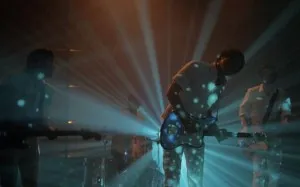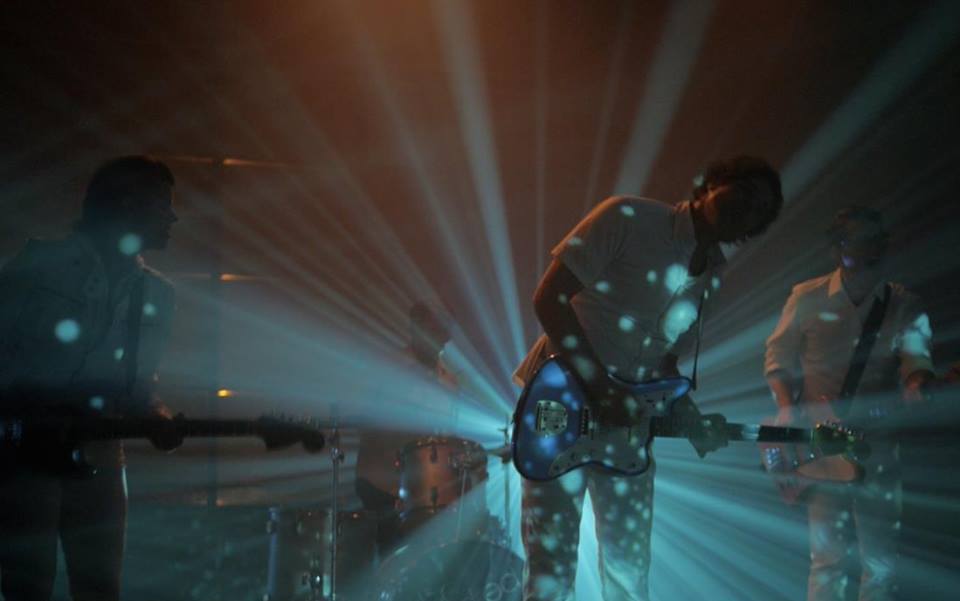
With a new EP full of slick riffs, catchy melodies and beats that make you want to dance, The Hundred Days are ready to take the Local Band Stage at Live 105’s annual BFD music festival this Sunday. We sat down with the “dark, dance-y and poppy in all the right places” band after their energetic performance at The Rickshaw Stop in San Francisco to talk about writing music, the local music scene and how they’ve evolved as a band.
The Stanford Daily (TSD): Every musician and band has their own way of writing music, so how do you guys start writing a song?
Ash Scheiding, guitarist/vocals (AS): Usually one of us is screwing around and Jon is like ‘keep playing that.’
Jon Smith, lead vocals (JS): We also record everything on this [picks up his iPhone]. I’ve learned to do that because every single time we stop, and I’m like ‘wait, play that again,’ no one can ever remember what they just played. Including me. It’s always spontaneous and almost unconscious when you’re really in the space and everyone is feeding off of each other. A lot of times we’ll get like five to 10 ideas out of a rehearsal. I’ll take it home, put it on my computer, and send it out to everyone and be like ‘which ones do you guys like?’ Usually less than one in 20 will make it into one of our songs.
Brett Zadio, bass (BZ): It’s not like ‘oh, we’re writing a song today.’ We’re always trying to write songs. So there are a couple days where we have to run the set, but we’re usually just writing all the time.
Colin Crosskill, drums (CC): Sometimes we’ll have a show coming up, and we know we need to practice the set. We end up procrastinating, and all of these ideas come up. It’s like when you have to study for a test and some other project is all of the sudden so much more interesting because you don’t want to study.
TSD: How has your music and band evolved?
AS: I thought I was getting into a totally different band to be honest. I was really into the “Really” record, which is the one they did before we started working together. I was surprised to go into an audition, and<\p>…<\p>it turned right away into a writing session. It changed immediately, the sound. I feel like these guys were so open to that, and it wasn’t like walking into a steady brand.
JS: We were ready to expand. We went from very dance-y to a little bit darker.
AS: There’s a pop sensibility, but there’s this way of combining parts that aren’t even in the same key. Somehow through this crazy process we’re able to piece these parts together. My head spins almost every time I’m at practice with these guys.
TSD: A lot of local bands are moving to LA, how do you feel about the San Francisco music scene?
CC: It’s hard. Okay, the glass is half full in that you’re focused on the music because there’s no industry. There’s no opportunity. This is a dead-end city. It focuses you on<\p>…<\p>writ[ing] the best music possible. Whereas in LA, there’s so much opportunity and so much industry. So in LA, people are a little over-consumed with that and not so much with being the greatest musician possible and writing the best songs possible. Instead, it’s more like what’s going to get me singed and in the door.
JS: The artists are mostly gone. There are some bands left but not a lot. We’re sort of like an endangered species now.
AS: I actually think there is still a lot of talent in the Bay Area. I have noticed, personally, that it has gotten harder with venues. Just the pressure with one of the highest rents in the country, I have noticed a certain change in demographic as far as which venues you play. [At] certain venues, there is pressure to bring in national touring acts that bring more [people]. Because they got to pay the rent and people want to go see that. But it’s not dead. I don’t think so.
TSD: I always find it interesting to know what everyone’s first concert was.
JS: Mine was Thriller.
CC: James Taylor
AS: My mom took me to see Chicago.
BZ: I saw Vanilla Ice open for MC Hammer.
This interview has been lightly edited and condensed.
Contact Gabriela Groth at gngroth “at” stanford.edu.
